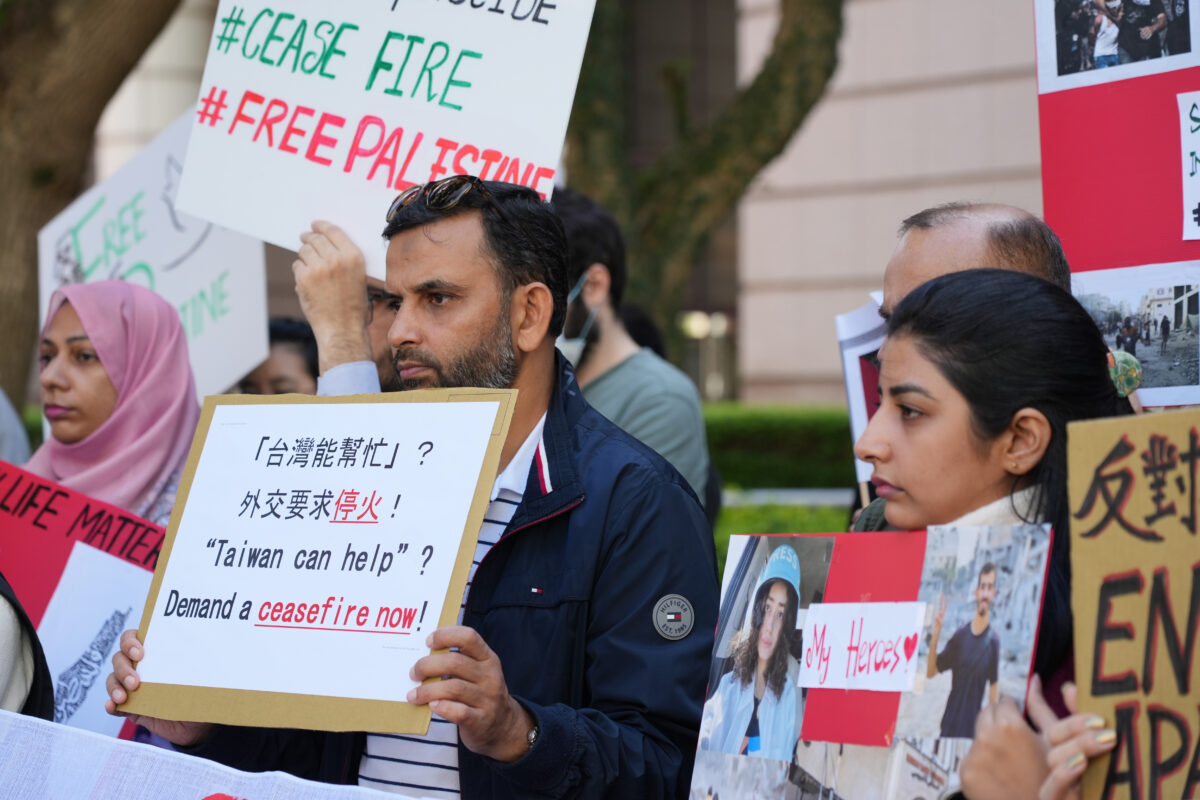As in much of the global South, the Goethe-Institut (GI) in India — also locally known as the Max Mueller Bhavan, after the Orientalist philologist Max Müller — plays a key strategic role in maintaining German soft power in the country. A particularly useful tool to reinforce this soft power has historically been the strategic use of cultural funding, to assimilate academics, artists and cultural workers into the fold. Ultimately, this is one of many tools that serve to construct Western hegemony: where (some) subjects in the global South accede to Western dominance willingly, rather than having to be coerced into it.
Since the start of the Israeli genocide in Gaza, the contradictions between the desire to maintain this hegemony in the global South, and unconditional solidarity with the State of Israel, have been stretched to absolute breaking point. This is particularly true in Germany — where the cynical use of the Staatsräson has led to deportations, clampdowns on protests, the suppression of academic and artistic freedoms, and the systematic withdrawal of state support from organisations that refuse to toe the German line on Israel. This has applied to organisations both within and outside Germany.
On December 8, 2024, a small collective of queer filmmakers and activists disrupted the closing screening at EXPERIMENTA 2024, a film festival organised at the GI in Bangalore, with a guerilla recording of their conversation with the institute’s director about the GI’s “red lines” on the genocide. The collective — now called badnām (बदनाम/بدنام) [infamous] — are going to be organising their own film festival in Bangalore, from 24–26 April. You can find a longer statement about this action on their Instagram. What follows is our conversation with badnām.
The many absurdities of the German positioning on Palestine are extremely visible to those of us who live here, as are recent actions against it, like Strike Germany. How did this end up on your radar in India?
We are connected to the internet the same way most of the world is. It’s difficult not to be aware — which is exactly what we’ve been trying to say to those who continue to liaise with the GI (GI), pretending they have no idea what’s happening in Germany, or even in Gaza. For those who’ve somehow managed to become ascetics like that, who still haven’t noticed there’s an ongoing genocide being livestreamed 24/7 while they post “outfit of the day” stories or repost invitations to their next event at the Goethe Institut, our disruption was hopefully informative. But beyond that, there’s a very real political mirroring between the German state’s Islamophobia and the Hindutva state’s crackdown on dissent in India. The mechanisms of censorship, surveillance, and cultural policing are deeply familiar to us. German cultural institutions, in this context, position themselves as benevolent actors working in an “illiberal context” — while conveniently erasing their own violent complicity in Palestine.
Your film “masturbation is easy, finding the video is hard” begins with a guerilla recording of your conversation with the GI director in Bangalore on the institute’s “red lines” on Gaza. Has this resulted in any legal threats?
Not directly, but we wouldn’t be surprised if it eventually does. Institutions like the GI operate through reputational management. They don’t want public legal battles because that would draw more attention to the issue. Instead, their PR strategy is institutional memory-holing: ignoring and infantilising our work, and quietly excluding certain filmmakers or activists from future opportunities. It’s more about slow erasure than immediate confrontation.
The GI did attempt to retrospectively declare that the meeting recorded in the film was confidential and expressed “disappointment” with us. The question of consent is often raised when guerrilla recordings are involved, and curiously, it was Indian programmers and artists — who were most insistent on this point. Many of them, despite years of engaging in feminist and queer programming, suddenly and conveniently forgot the hierarchy of power between the GI (with its 151 offices worldwide) and a few individuals questioning how such an institute exercises its influence.
Ultimately, there was nothing in the guerrilla recording that had not already been publicly stated by the GI and more locally, also repeated by their director at events in Bangalore. So where does the discomfort come from? Why does listening to this conversation, one just like so many they have been part of since October 7 when trying to negotiate with this institute cause such unease?
What kind of reactions did you get from the Goethe-Institut organisers, or from participants at Experimenta?
In the time following our disruption, we wrote to the GI, attempting to further engage with the questions we were raising. Our emails were met with silence. Even when we took this to social media, their eventual response was laughably predictable: bureaucratic, paternalistic, and ultimately defensive. What felt more telling, though, was the disengagement — and in some cases, outright justifications — from within the Indian cultural milieu. People who privately expressed solidarity but refused to say anything publicly out of fear of losing future funding or festival opportunities.
This is precisely the culture of complicity and self-censorship we were trying to confront: the way German (and Western) institutions breed the illusion of being “neutral platforms” while actively policing Palestinian solidarity. What’s worse is how they get local cultural partners to do the dirty work of manufacturing consent for them. It’s tricky, because a “progressive” institution like the GI wants to do a certain amount of queer programming every year. You can rest assured that some heterosexual, cisgendered, very well-meaning progressive will arrive at the Institut to do this “work” for them. In fact, queer and marginalised dissenters are likely to be disinvited from GI-sponsored queer “soirees” with horrible watered-down alcohol, by cisgendered and straight “friends of the institute”, who find your politics “too aggressive”, even “misplaced, no matter how urgent or relevant”.
What is most offensive, of course, is that they imagine we’d even want to be there.
India, like a lot of the global South, relies to some extent on culture/arts funding from the global North. Though this was always the case, German anxieties around Israel have really underscored that this support comes at a price. How do you think artists can work around these institutional limitations?
Not sure we believe in “workarounds” anymore. As conflict-oriented as it might sound, we have to work despite — and even against — these structures, not around them. What workaround can there be when your very humanity is at odds with imperialism, colonialism, racism, capitalism? When you want to turn the lens on the very system that once celebrated your “political”, “radical” work — so long as it absolved and sanctified them?
For instance — the film Sab changa si [All Was Good], about the student protests against the Indian Citizenship Amendment Act, premiered at the Berlinale Forum Expanded and won the Peace Film Prize (awarded by the Heinrich Böll Institut) in 2022. Fast forward to 2023, the same institute pulls out of a conference where Masha Gessen was invited and continues to toe the peculiar German line on the genocide. It makes any validation or recognition of our struggles from these institutions feel absolutely meaningless. So yes — we are okay with making the films we want to make with what we can afford, storing them on our hard drives, or sharing them with communities organising outside of these spaces. At least then the work remains honest. If it means having a day job to pay the bills while you continue your artistic work, then that’s how.
Until something changes. And something will change if enough people demand it. What’s amazing is how short our memories are as a newly independent country. Many Indian cultural workers who resisted censorship in the ‘90s and the early 2000s turned to Western institutions for funding, particularly when India’s economy opened up during globalisation. Institutions like the GI, the Ford Foundation, British Council, and European film funds became alternative sources of support as independent filmmakers found it nearly impossible to work within the structures of state or corporate financing. But the point can’t then be to cling to another system that is equally violent and restrictive for artistic freedom — a system that, in fact, shapes what is allowed as liberty within our local cultural industries.
This isn’t unique to India. Filmmakers across Latin America, Africa, and the Middle East have faced similar contradictions. From when cultural funding was used as a soft power strategy during the Cold War, to today’s festival circuits that double as geopolitical gatekeepers, the pattern remains the same. If your work doesn’t absolve your funders, you will find yourselves on the outside. So what good is that freedom? What interesting work can you produce if you’re bound by these red lines? Our simple observation — subjectively of course — is that a lot of the art that emerges out of these “diplomatic negotiations” with institutions is frankly just bad. We’d say: don’t work around it. Spare us.
I’m reminded of the recent cancellation of the DJ Leila Moon in Switzerland, where a crowdfunding campaign ended up replacing the prize she was meant to be awarded. Do you think this sort of solidarity-as-praxis can be a viable stop-gap strategy for artists in the global South?
Alternative infrastructures are necessary but not a structural solution. As we understood with the Leila Moon incident, such instances perhaps highlight the fragility of institutional support but certainly do not dismantle its monopoly. The real question is whether we can build systems that don’t require institutional validation at all. Otherwise, we’re still playing the same game on harder difficulty settings.
For us, if there is a way forward, it isn’t through the fantasy that we can continue to navigate these spaces without compromise. It’s through real acts of refusal which will certainly risk exclusion and have to determinedly refuse to play by the rules of these institutions which are designed to absorb and neutralise dissent. Anything else would be purely self-serving.
The synergy between Hindutva and Zionism is easy to understand, given their shared hatred for Muslims. Yet these “outright justifications” emerge from the culture scene, from people who are (at least not openly) Hindu nationalist. Do you think this is purely cynical materialism, or is there an ideological component to it as well?
Zionism and Hindutva aren’t just about religion or nationalism; they are capitalist projects that use religious identity as a tool for mass mobilisation. Their ideological justifications — whether the “Jewish homeland” or “Akhand Bharat” [undivided India] — serve as convenient covers for resource extraction, real-estate expansion, labour exploitation, and militarisation. Religion is the language they use, but the machine itself is deeply capitalist. In Palestine, Israeli settlements are profit-driven enterprises, with multinational companies funding displacement and profiting from surveillance, arms manufacturing, and resource extraction. In India, Hindutva is aligned with crony capitalists like Adani and Ambani, whose wealth depends on land grabs, labour deregulation, and state-backed monopolies. The 2002 anti-Muslim pogroms in Gujarat were followed by a massive real estate boom — displaced Muslim neighbourhoods became prime land for developers. Ethnic cleansing isn’t just ideological; it’s profitable.
The capitalist machinery also manufactures the illusion that participation in Zionism or Hindutva offers a path to economic and social mobility. The majority are kept invested in a system that ultimately benefits only the elite, and promised that by becoming a better Zionist, a better sanghi [Hindu nationalist; pejorative], they can access power otherwise denied to them. In reality, their conditions remain the same (or worsen) while the ruling class consolidates power, using aspirational nationalism as both carrot and stick. The Hindutva/Israel alliance is often framed as being purely about Islamophobia, but in India for example, Christian institutions are frequently attacked because they provide services that challenge upper-caste and state control, like education and social work. The dominant narrative centres on a “Muslim vs. Hindu”, or “Muslim vs. Jewish” conflict because it is easier to sell.
Ultimately, this violence isn’t just about identity, but about restructuring economies in ways that concentrate power among the elite. The real challenge is disrupting the economic engines that make these pogroms profitable.
So when cultural figures and institutions justify or remain silent about Zionist and Hindutva violence, it’s because they are invested in the system that sustains them. The material stakes for people the West calls “artists at risk” are obvious: grants, residencies, film festivals, institutional support. These institutions also don’t just fund art; they shape what is considered acceptable discourse, and the longer one engages with them, the more their limits become internalised. Certain words become unspeakable and certain solidarities become untenable. A genocide can be framed as a tragedy, a war, a “complicated issue,” but never as an explicit colonial project. You can critique right-wing authoritarianism while maintaining a pragmatic silence on the industries that enable it. You can wear a keffiyeh, sign an open letter, and call a genocide a genocide (only) in private conversations or in closed rooms, to strategically maintain political credibility while staying within the safe bounds of institutional approval. In India, elite cultural spaces will programme anti-caste, queer, and feminist work — so long as it remains within digestible, upper-caste frameworks. Anything that directly implicates the institutions funding these spaces or calls out capital as the central force behind oppression is pushed to the margins.
Institutions, of course, encourage and benefit from this kind of controlled opposition. Institutions need a certain degree of aestheticised dissent to maintain legitimacy. If every artist associated with them were completely silent on Palestine, for example, their neutrality would be too obviously compromised. So they allow for meticulously curated outrage — as long as it remains within the realm of discourse, never crossing into material action or intervention. An artist can make a film about Kashmir; Modi; or even Gaza; but if they call for a boycott of the very institutions screening their work, they will find themselves quietly disinvited from future projects for being too difficult or immature. A festival can programme radical work, but not if it directly implicates the corporations funding it. These aren’t contradictions; they are the ideological scaffolding of cultural power.
The irony is particularly apparent to us in our “independent” film spaces. Among a certain category of cultural workers and filmmakers, there has long been a clear opposition to the Indian state’s censorship, especially when it comes to the violence it inflicts on marginalised groups. Over the past two decades, filmmakers have repeatedly come together to resist state control over films and festival spaces. And yet, there is now a tacit acceptance of the way German and other western cultural institutions define what can and cannot be said in film and art. Apparently, funding — and the meagre benefits of international status in the art and film circuits — has been enough to sway them. That this censorship is not all that different from the Hindutva project (and in fact feeds into it) is something that no one wants to directly acknowledge at this moment.
What lies ahead for badnām, and what can we do to help in Berlin?
After our disruption and everything that followed, we were sitting with thoughts of how it would be possible for us, as filmmakers and artists ourselves, to ever do or distribute any meaningful work in these times. We were informed, very matter-of-factly, that this would be made impossible. Another counter was that we should do “these things” at our own festival — the implication being that putting together a festival (without being complicit with institutions like the GI) was a labour we had never attempted, and so we had no right to demand anything from those who did put in the work the best they could.
This made us truly wonder if it was actually so impossible. We thought we’d find out for ourselves, and remain(ed) open to learning that maybe there’s no way. But we had to try. That’s why we started talking to collectives and groups all over the world, and decided we’d be very ambitious — reaching out to filmmakers, etc., to see if they’d be willing to donate their works for us to screen in Bangalore. We even reached out to the Guerrilla Girls to ask if they’d design our poster — and they wrote back!
The response and enthusiasm from filmmakers who’ve been experiencing similar censorship and gatekeeping was overwhelming, even surprising. We put out a call for films in February and received over 150 submissions from more than 43 countries. We found a venue — an independent bookstore in the city with a screening space that can accommodate 100 people — and we’re now doing this festival from 24–26 April. It’s been a whirlwind, but to answer what we were left wondering, starting from that disruption at GI: is it possible at all to do cultural work that isn’t complicit? We think yes. It’s labour, undoubtedly, but it’s a labour of love.
The isolation and alienation that the system hoped we would feel isn’t really working, because the collaborations we’re building — as people first, with others all around the world — are in a small measure, what restores our hope. They’re what will allow us to return to the film work we actually want to do. We don’t want to forever be reactive to this censorship and its custodians, and carry that energy into our films.
The way we see it — and the films we received for the festival have reminded and humbled us of this again — cinema is about life itself. And life, if it is to mean anything, must be for all. At a fundamental level, what’s happening in Gaza, and in so many places around the world, is completely at odds with the spirit of film work. Of course, we want to feel open and trusting of the world and the people in it — as we inherently do, usually. And we want to be moved to film slow, beautiful, sexy, tender things.
This festival is us carving out a little space to resolve, address, perhaps even exhaust, the disappointment and anger we’ve been feeling towards the cultural milieu. We’re even scheduling a “disruption slot” into the programme, to cheekily invite dialogue from anybody who wants to show up and have the conversations we’ve been seeking for a long time.
After the festival, we will return to the work we know and love best, which is making films, writing, and just spending time with each other. No matter the fate of our future works, we will at least have proven to ourselves that we are not alone in this. And more importantly, that cinema, as we have known and loved it, is well and alive.




